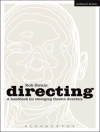Contributions by Cynthia Baron, Elizabeth Binggeli, Kimberly Nichele Brown, Priscilla Layne, Eric Pierson, Charlene Regester, Ellen C. Scott, Tanya L. Shields, and Judith E. Smith
Intersecting Aesthetics: Literary Adaptations and Cinematic Representations of Blackness illuminates cultural and material trends that shaped Black film adaptations during the twentieth century. Contributors to this collection reveal how Black literary and filmic texts are sites of negotiation between dominant and resistant perspectives. Their work ultimately explores the effects racial perspectives have on film adaptations and how race-inflected cultural norms have influenced studio and independent film depictions. Several chapters analyze how self-censorship and industry censorship affect Black writing and the adaptations of Black stories in early to mid-twentieth-century America. Using archival material, contributors demonstrate the ways commercial obstacles have led Black writers and white-dominated studios to mask Black experiences. Other chapters document instances in which Black writers and directors navigate cultural norms and material realities to realize their visions in literary works, independent films, and studio productions. Through uncovering patterns in Black film adaptations,
Intersecting Aesthetics reveals themes, aesthetic strategies, and cultural dynamics that rightfully belong to accounts of film adaptation.
The volume considers travelogue and autobiography sources along with the fiction of Black authors H. G. de Lisser, Richard Wright, Ann Petry, Frank Yerby, and Walter Mosley. Contributors examine independent films
The Love Wanga (1936) and
The Devil’s Daughter (1939); Melvin Van Peebles’s first feature,
The Story of a Three Day Pass (1967); and the Senegalese film
Karmen Geï (2001). They also explore studio-era films
In This Our Life (1942),
The Foxes of Harrow (1947),
Lydia Bailey (1952),
The Golden Hawk (1952), and
The Saracen Blade (1954) and post-studio films
The Learning Tree (1969),
Shaft (1971),
Lady Sings the Blues (1972), and
Devil in a Blue Dress (1995).
O autorze
Robin G. Vander is associate professor in the Department of English at Xavier University of Louisiana. She is coeditor of Percival Everett: Writing Other/Wise (2014) and Perspectives on Percival Everett (2013). She is coeditor of two issues of the Xavier Review: “Celebrating Jesmyn Ward: Critical Readings and Scholarly Responses” (2018) and “Reading the Intersections of Sex and Spirit in the Creative Arts” (2007). Her article “The African American Population in New Orleans after Hurricane Katrina” appears in The Review of Black Political Economy (2011).












